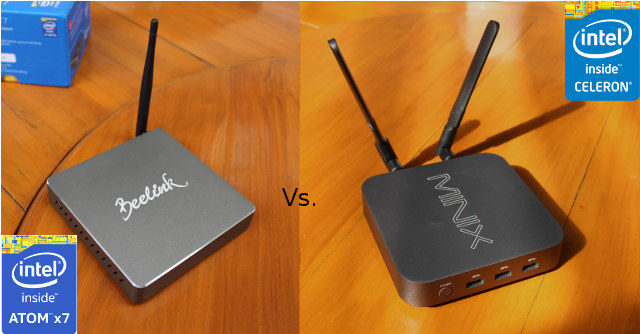Intel tend to release lots of processors, and it’s not also clear how they perform against each others, but generally the rank from slowest to highest goes something like Atom < Celeron < Pentium < Core M < Core i3 < Core i5 < Core i7. Recently, I’ve seen and reviewed a few low power Intel Atom x7-Z8700 “Cherry Trail” and Intel Celeron N3150 “Braswell” mini PCs, both quad core processors @ 1.6 GHz (base), and I could not find much differences between the two during use.
So to have a clear and objective view of the relative performance of the two processors, I’ve compared the results I got with Intel Atom x7-Z8700 based Beelink BT7 mini PC to the ones I got with MINIX NGC-1 mini PC powered by Celeron N3150 processor in the table below. Both machines have been designed quite well (good heat dissipation) and with storage devices having similar performance. A ratio greater than one (green) means the Celeron processor is faster, and if it is lower than one (red) the Atom processor prevails.
| Benchmark | Beelink BT7 Intel Atom x7-Z8700 @ 1.6 GHz / 2.48 Ghz (Turbo) |
MINIX NGC-1 Intel Celeron N3150 @ 1.6 GHz / 2.08 GHz (Turbo) |
Ratio |
| PCMark 8 Accelerated | |||
| Overall Score | 1,509 | 1,492 | 0.99 |
| Web Browsing – JunglePin | 0.59309s | 0.63426s | 0.94 |
| Web Browsing – Amazonia | 0.19451s | 0.2141s | 0.91 |
| Writing | 8.53975s | 9.3966s | 0.91 |
| Casual Gaming | 7.96 fps | 9.7 fps | 1.22 |
| Video Chat playback | 29.99 fps | 30.01 fps | 1.00 |
| Video Chat encoding | 301 ms | 193.333 ms | 1.56 |
| Photo Editing | 0.65544s | 0.81038s | 0.81 |
| Passmark 8 | |||
| Passmark Rating | 846 | 781.9 | 0.92 |
| 3DMark | |||
| Ice Storm 1.2 | 23,999 | 23,032 | 0.96 |
| Cloud Gate 1.1 | 2,185 | 1,961 | 0.90 |
| Sky Diver 1.0 | 1,131 | 1,108 | 0.98 |
| Fire Strike | 276 | 258 | 0.93 |
So in the end, both processors have a very close performance, except for video chat encoding where the Atom processor is about 56% slower than the Celeron processor. The Atom’s 16 EU GPU @ 200/600 MHz is faster than the Celeron’s 12 EU GPU @ 300/640 MHz in most case, but only marginally. Both SoCs are capable of decoding 4K videos with H.264 and H.265 video codecs. Systems based on the Intel Axom x7-Z8700 processor could consume less electricity as Atom x7 has a 2W SDP, while Celeron N3150 a 4W SDP, but the power consumption of a complete mini PC also depends on its overall design.
So there seems to be very little to gain by purchasing a system with Celeron N3150 “Braswell” processor over one with a Atom x7 “Cherry Trail processor, if a mini PC matches your requirements. One noticeable advantage of Braswell processors should be Linux support with the default/standard ISO images, while Atom x7 systems currently require community hacked ISO images for support of features such as HDMI audio, WiFi and Bluetooth. You can also find a side-by-side comparison of the features of the two processor on Intel website.

Jean-Luc started CNX Software in 2010 as a part-time endeavor, before quitting his job as a software engineering manager, and starting to write daily news, and reviews full time later in 2011.
Support CNX Software! Donate via cryptocurrencies, become a Patron on Patreon, or purchase goods on Amazon or Aliexpress






Not much point buying anything with Atom processors which will be discontinued, or with Braswell processors, since the forthcoming Apollo Lake processors are reputed to have a significant performance increase over Braswell but at similar low powers.
Until then (and for some time after until old stock is cleared) there will be no doubt lots of promotional items to persuade people to buy equipment with processors past their sell by date.
@Lieutenant Colonel Olivier South
Huh, what? I think there’s some serious misinformation going around. Intel only discontinued the Atom processors for phones, the X5 series is going to continue, as it’s targeting tablets and low-cost notebooks.
Also, Apollo Lake won’t be out until sometime in the third quarter of this year, so you’ll have to wait quite a while for a “maybe” in terms of performance improvements.
I don’t see either of these as past their sell by date and it really all comes down to what people need, no?
The performance should be around 30% better -> http://liliputing.com/2016/06/intel-apollo-lake-chips-offer-30-percent-performance-boost-braswell.html
But the current systems based on Atom x5/x7 and Celeron/Pentium Braswell processors can still meet the requirements of many people.
@TLS
“the X5 series is going to continue”
According to PC World:
“Intel is also discontinuing its Atom X5 line of tablet chips code-named Cherry Trail, which is being replaced by Pentium and Celeron chips code-named Apollo Lake, aimed more at hybrids than pure tablets.”
Is that correct or not? And so which Atom processors are going to continue?
Also is there not a question of the level of Linux support for Atom processors?
@Lieutenant Colonel Olivier South
What I understand is that instead Intel canceled the next generation Atom series for smartphones, but the company will still keep on selling Atom x5/x7 processors. Liliputing issued an update @ http://liliputing.com/2016/04/reports-intel-is-killing-off-low-power-atom-chips.html
Some companies publish their end-of-life dates, but Intel does not seem to publish those, or I can’t find it.
Overall score 1,509 – 1,492 – 0.99. What’s with your math? If I divide 1,509/1,492 = 1,01.
@rafisganeyev
1492/1509=0.99
There’s a great promo on BG presently – X5 for $47.